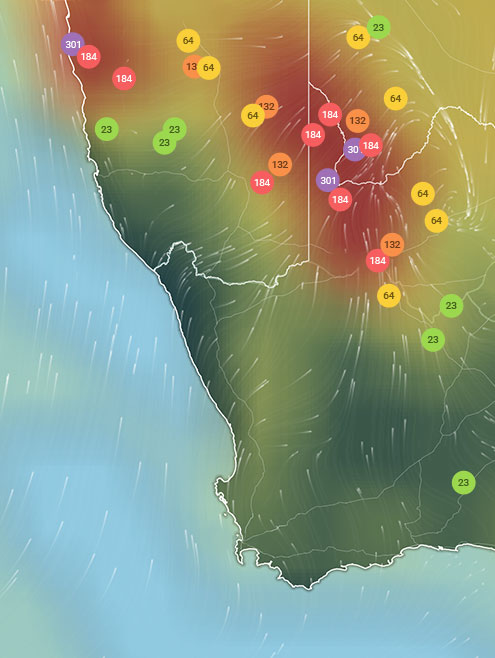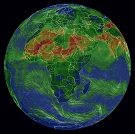Be the first to measure and contribute air quality data to your community
132.6K people follow this city






AIR QUALITY DATA SOURCE
Find out more about contributors and data sources| Weather | Few clouds |
| Temperature | 86°F |
| Humidity | 89% |
| Wind | 5.7 mp/h |
| Pressure | 29.8 Hg |
| # | city | US AQI |
|---|---|---|
| 1 | Hanoi, Hanoi | 166 |
| 2 | Tay Ho, Hanoi | 164 |
| 3 | Haiphong, Thanh Pho Hai Phong | 112 |
| 4 | Ho Chi Minh City, Ho Chi Minh City | 33 |
| 5 | Tra Vinh, Tinh Tra Vinh | 32 |
(local time)
SEE WORLD AQI RANKING
US AQI
49*
live AQI index
Good
| Air pollution level | Air quality index | Main pollutant |
|---|---|---|
| Good | 49* US AQI | PM2.5 |
| Pollutants | Concentration | |
|---|---|---|
| PM2.5 | 12*µg/m³ | |
PM2.5
x2.4
PM2.5 concentration in Thu Dau Mot is currently 2.4 times the WHO annual air quality guideline value
| Enjoy outdoor activities | |
| Open your windows to bring clean, fresh air indoors GET A MONITOR |
| Day | Pollution level | Weather | Temperature | Wind |
|---|---|---|---|---|
| Today | Good 49 AQI US | 102.2° 80.6° | ||
| Friday, Apr 26 | Moderate 52 AQI US | 104° 82.4° | ||
| Saturday, Apr 27 | Moderate 52 AQI US | 104° 82.4° | ||
| Sunday, Apr 28 | Moderate 52 AQI US | 105.8° 82.4° | ||
| Monday, Apr 29 | Moderate 51 AQI US | 104° 82.4° | ||
| Tuesday, Apr 30 | Moderate 54 AQI US | 104° 82.4° | ||
| Wednesday, May 1 | Moderate 59 AQI US | 102.2° 82.4° | ||
| Thursday, May 2 | Moderate 61 AQI US | 104° 82.4° |
Interested in hourly forecast? Get the app
Thủ Dầu Một is the capital city of Bình Dương Province in southern Vietnam. It is approximately 20 kilometres north of Ho Chi Minh City. In 2018 it had a population of around 417,000. At the end of December 2020, the air quality index classified it as “Unhealthy” with a US AQI reading of 158. The main pollutant PM2.5 had a concentration of 68.2 µg/m³. According to suggested levels made by the World Health Organisation (WHO), an acceptable PM2.5 level is 10 µg/m³. With readings of this magnitude, it is advisable to wear a good quality face mask when going outside. Closing doors and windows will help stop the dirty air entering the house. It is suggested that an air purifier is used if there is access to one, and outdoor exercise is to be avoided.
Air pollution comes from many sources. Usually in urban areas such as Ho Chi Minh City traffic activities are the main source of emissions, accounting for about 55-60 per cent. The second place is industrial production establishments, small industries which account for 25-30 per cent, the rest only about 5 per cent of emissions come from people's activities, such as biomass cooking and heating.
Being a province with a rapid growth rate in all fields: infrastructure, industry and agriculture, one of the major challenges of Binh Duong are to achieve the goal of sustainable development, linking socio-economic development with the environmental protection department.
According to the results of periodic monitoring at certain times of the day of February 2019, it shows that the current air pollution problem in Thu Dau Mot city is dust and noise pollution. Dust pollution is evident in the main traffic routes and mineral exploitation areas. Along with dust pollution, the noise also exceeds the permitted standards at most intersections. The gases carbon monoxide (CO), nitrogen dioxide (NO2), sulphur dioxide (SO2) and ozone (O3) suspended in the air in Thu Dau Mot city are all above the permitted level. Air pollution problems in Thu Dau Mot city are mainly caused by dust
Local air quality is highly dependent on weather and climatic conditions. The PM2.5 index of fine dust increases due to changing weather, drier air, and heat inversion, which increases the concentration of pollutants in the air. Especially in the early morning, the wind is calm, so the spreading capacity is low. When the sunlight heats the air layer near the ground, there is no inversion of heat, PM2.5 fine dust is dispersed and the air quality improves. Considering the rainfall in late autumn and early winter in 2019 in Thu Dau Mot city shows that because of low rainfall sudden high concentration of dust in the air is noticed.
Projects to build modern air purification systems need to be strengthened in developing countries.
The areas where the project works are being implemented, the higher the amount of dust there is. Compared with the previous monitoring periods, the amount of dust did not fluctuate much but there is an increasing trend in industrial zones and intersections. With the above situation, the first step is to offer solutions for industrial zones to filter air before being discharged into the atmosphere. It is necessary to build exhaust gas filtration and suction zones in Binh Duong industrial zones. The air filtration system must be tested for quality in accordance with heavy industrial zones that produce a lot of emissions into the environment. It is necessary to re-check the air filtration systems in long-term production facilities, to support funding for those establishments that cannot afford to build air purification zones. For intersections, trees should be planted to help filter out the toxic gases released into the air. Planting trees on both sides of the road is a green solution for the environment. Segregation of intersections in key areas, or traffic jams, etc.
To develop transportation in the direction of using mass transit (buses, trams), restricting the use of private vehicles, and encouraging the use of electric and LPG gas-powered vehicles. Enhance control of exhaust gas for cars and motorcycles and eliminate cars more than 15 years old because they are not fitted with the latest technology which helps to reduce harmful emissions.
The main components of air pollution in developed countries are nitrogen dioxide (from burning fossil fuels), ozone (due to the effect of sunlight on nitrogen dioxide and hydrocarbons) and solid particles or particles suspended in liquids. Indoors, passive smoking is a source of pollution, as is the burning of biofuels (e.g. wood, animal waste, crops) in developing countries (e.g. cooking and heating).
High levels of air pollution can adversely affect lung function, the onset of asthma exacerbations and COPD. Air pollution also increases the risk of acute cardiovascular diseases (such as myocardial infarction) and the progression of coronary artery disease. People living in areas with high traffic volumes, especially when the air is stagnant created by heat reversal, are at particular risk. All standards are referred to as air pollutants (nitrogen oxides, sulphur oxides, ozone, carbon monoxide, lead and particulates), except for carbon monoxide and lead, which cause increased airway reactivity. Long-term exposure can increase respiratory tract infections in the general community, especially in children, and may impair their lung functions.
Ozone, the main constituent of smog, is a powerful oxidizing and respiratory stimulant. Ozone levels tend to be highest during summer in the late morning and early afternoon. Short exposure can cause difficulty breathing, chest pain, and airway reaction. Children who regularly engage in outdoor activities during days with high ozone pollution are at risk of developing asthma. Prolonged exposure to ozone will slowly and permanently impair lung function.
Sulphur oxides arising from the burning of high sulphur fossil fuels can produce acid aerosols with high solubility, which will likely accumulate in the upper respiratory tract. Sulphur oxides can cause inflammation of the airways, which can increase the risk of chronic bronchitis as well as cause bronchospasm.
Air pollutant particles are a complex mixture, derived from the burning of fossil fuels (especially diesel). The particles can have both local and systemic inflammatory effects, suggesting an explanation for their effects on the lungs and cardiovascular system. The microscopic particulate matter PM2.5 (dust particles < 2.5 µg/m³.) induce an inflammatory response per unit mass greater than large particles. Data shows that particulate air pollution increases mortality from all causes, especially cardiovascular and respiratory disease.
No locations are available.